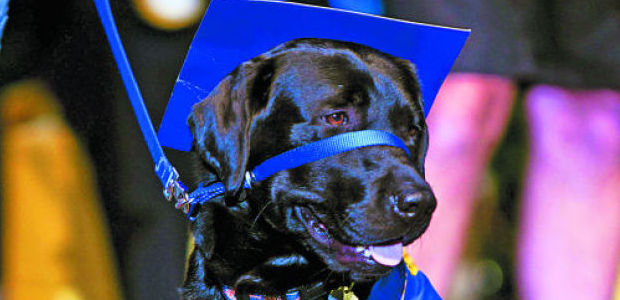EIA: Gulf production to increase by 25%
January 16, 2014I-49 prices cut, still eclipses $3B
January 16, 2014Duval has big, dark brown eyes and a tail that breaks into a quick, hearty wag at the sight of any potentially friendly human.
You wouldn’t necessarily want him guarding the house, but that’s not what this Labrador-retriever mix was trained for. This canine’s career has to do with opening doors rather than keeping them closed, particularly those within the minds of children who are witnesses to or victims of crime.
“Last year, we got Duval and we have gotten a whole new perspective,” said Tommy Beeson, chief investigator for Terrebonne Parish District Attorney Joe Waitz Jr. “When something traumatic has happened, Duval helps the child to talk about it. The dog is somebody here for them. He gives (children) the feeling, ‘I can tell him anything because he acts like he cares.’”
Waitz said he and his staff are closely watching Duval’s performance, to find ways over time of maximizing his potential.
“He is an excellent tool,” said Waitz. “For child victims and all victims, he allows people to feel comfortable in what can otherwise be a hostile environment, and help them to say their piece. He helps provide a comfort zone.”
At Waitz’s Children’s Advocacy Center, interviewers use Duval, properly attired in a royal blue jacket with the District Attorney’s insignia on the sides, to help put children at ease. They can lay on him, run toy cars up and down his back, pet him and walk with him to the courtroom where they may give testimony, knowing that he will be there with his tail wagging when they return from the witness stand.
Beeson, who once worked as a K-9 handler during his time at the Terrebonne Parish Sheriff’s Office, is Duval’s handler. He attended a special school in Florida where new service dogs “train” their handlers. They come in to work together, go home together and Beeson is the center of Duval’s world. Until children come into the picture; then Duval is all theirs.
“We love him,” said Dawn Buquet, advocacy center investigator. “I haven’t found anybody who doesn’t. He started with us at the end of May, and he was in interviews by August. Before school started this year, I did mock interviews with him and my own children and my co-workers’ children. He is so easy and friendly and pleasant.”
Duval was gifted to Terrebonne Parish by Canine Companions for Independence, a nationwide non-profit that breeds and trains working dogs for a variety of service tasks, from aiding the disabled – even turning light switches on and off, or opening and closing doors – to assisting the hearing and vision impaired.
The special training Duval received was as a “facility animal,” meaning he is prepared to work around and with many different people rather than a single person.
He was born on Oct. 31, 2010, in California, to a golden retriever dam named Zadra, sired by a Lab named Alvin II.
CCI spokeswoman Martha Johnson said that, according to agency policies, the pup and his littermates were to be given names starting with “D.” Because this pup was the facility’s second to be named Duval, he was officially named Duval II.
“These two breeds were chosen for a reason,” Johnson said. “The labs are working dogs, they live to work. The golden retriever is the emotional support. Take these two personalities, these two dogs, and we get the best of those two worlds.”
Once weaned and ready, Duval was sent to live with special puppy-raisers, in Salisbury, N.C. This agency has trained puppy-raisers throughout the country. Among them are teams of inmates at Dixon Correctional Institute in Louisiana and at prisons elsewhere, as well as with families in private homes.
The puppy-raisers teach the dogs basic commands and then move up to the more complex ideas, Johnson said. The trainers monitor skills and attributes, determining how well the pup is wired for its eventual duties.
“The trainers start to get a feel for that,” she said. “We have a lot of good relationships with facilities in town, if they think a dog is going to lean that way, they get a chance to be around a lot of people. We take them on field trips, check out the temperament. We look for special traits and great personalities.”
Only 40 percent of the trainee dogs make the grade.
“Some cannot do the work, they have a change of career, maybe with the FDA or as a drug searching dog, perhaps security at SeaWorld,” Johnson said.
The next step is specialized training with assigned handlers. Duval was introduced to Beeson at the CCI campus in Florida.
At CCI the instructors laugh, Johnson said, calling this period the time when dogs train the handlers.
Beeson, who has 40 years of law enforcement experience under his belt, welcomed the challenge.
For two weeks Tommy had to work intensively with Duval, learning all of the commands and their applications.
Proper ways of holding the leash are mastered, along with tips for grooming and feeding.
It was during this period that Johnson got to see Duval in action with his new partner.
“Duval loves to help people and has the temperament and the personality,” Johnson said. “They get to have great fun. When Duval goes home with Tommy he takes that vest off and they have some fun.”
A solemn graduation ceremony marked the official pairing of dog and handler, with a ritual handing of the leash from puppy trainer to permanent handler.
Then Duval was off to Terrebonne Parish.
But CCI would be keeping its eye on the dog and still does.
“One thing that is very important to us is that we are with that team for the lifetime of the working dog,” Johnson said. “We are there if Tommy has questions, if there is a behavior problem or a health problem. We do travel to check on them. In the first year there is closer monitoring, and less two years after. We want to see that same behavior two years after. We want to see a dog throughout. Most of these work for eight to 10 years.”
At the Advocacy Center, Duval lies on a special bed until he is called to meet a child. When children are brought in they are screened for dog-friendliness. Those who are too shy or fearful are not introduced to Duval. Those who are not are introduced to him right away, and it’s usually love at first sight.
“When some kids come here they sit in the lobby and you can see they don’t want to be here,” Buquet said. “When you talk about Dial you can see the demeanor change. Some of them try to relax and that is when you see a smile on their face. During a break in questioning they will loosen up and sometimes start talking to Duval. One child sat in that room and started talking to Duval about what had happened to him.”
For Beeson, work with Duval has brought a whole new perspective to an old career.
“I have never met a dog anywhere like him,” Beeson said.











